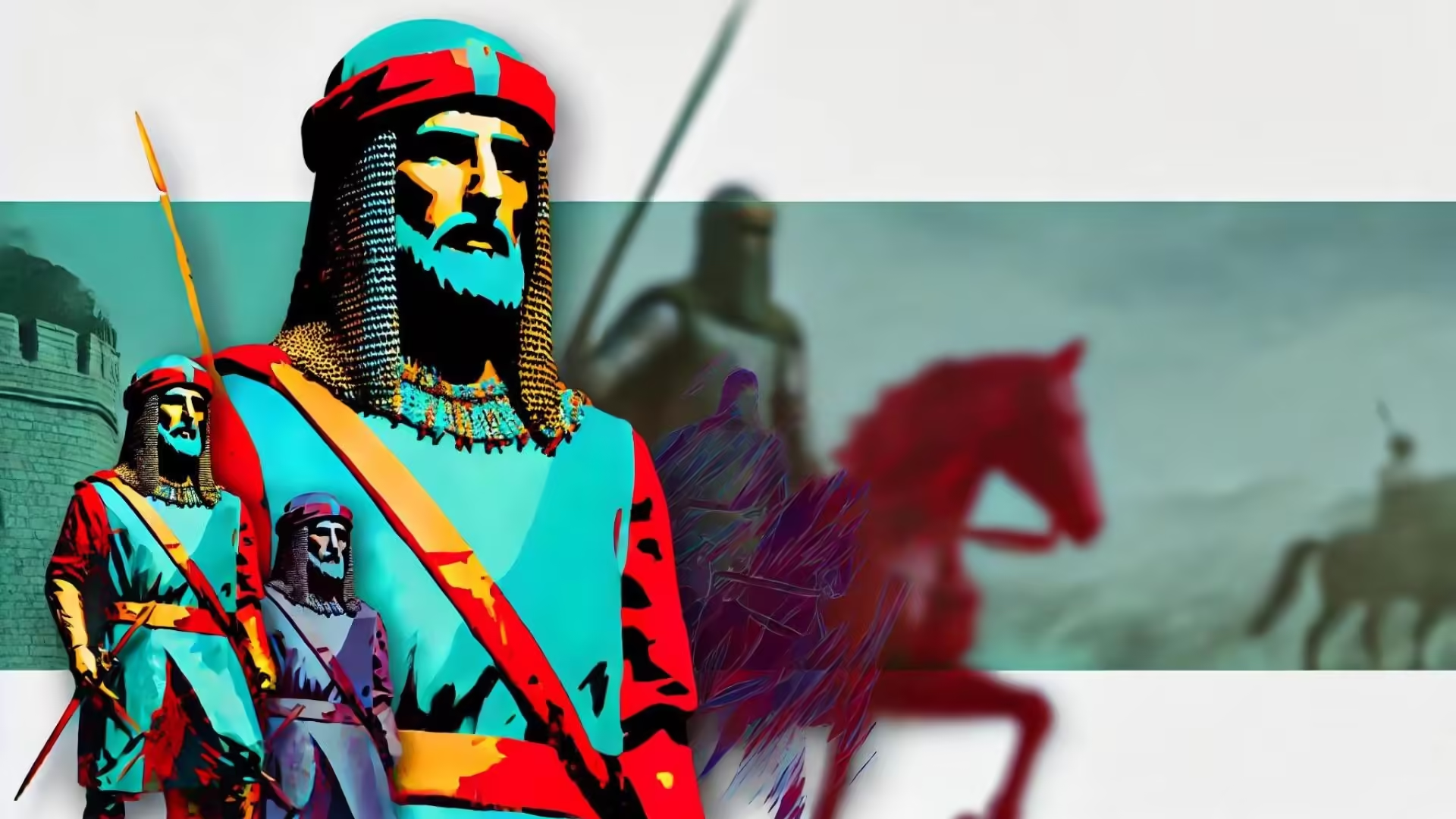Khalid ibn al-Walid, a name that resonates throughout history, is known as one of the greatest military commanders of all time. Born in Mecca around 592 CE, Khalid rose to prominence through his exceptional skills on the battlefield, earning the title “Saif Allah,” or “The Sword of Allah.” His life was marked by remarkable achievements, both in his military career and his unwavering dedication to Islam. Khalid’s legacy continues to influence military strategy and leadership even today.
Early Life and Conversion to Islam
Khalid ibn al-Walid was born into the powerful Quraysh tribe in Mecca, a tribe initially opposed to the spread of Islam. His early life was shaped by the tribal conflicts and power struggles that characterized pre-Islamic Arabia. Khalid was known for his courage and tactical prowess even before his conversion to Islam, and he played a key role in the early battles against the Muslim community.
One of Khalid’s most notable early achievements was his role in the Battle of Uhud, where his strategic genius led to a temporary defeat of the Muslim forces. However, after the Treaty of Hudaybiyyah, Khalid began to reflect on the message of Islam and eventually converted. His conversion marked a turning point, as he became one of Islam’s most devoted and successful generals.
The Sword of Allah: Military Achievements
Khalid ibn al-Walid’s military career is legendary, with a series of victories that have solidified his reputation as one of history’s greatest commanders. He participated in more than a hundred battles, never losing a single one. His ability to outmaneuver and outthink his opponents earned him the nickname “The Sword of Allah.”
Some of Khalid’s most significant military achievements include:
- Battle of Mu’tah (629 CE): This was one of Khalid’s first battles as a Muslim commander. Despite being heavily outnumbered by the Byzantine forces, Khalid’s brilliant tactics allowed the Muslim army to withdraw safely, earning him the respect of his peers and the title “Saif Allah” from the Prophet Muhammad.
- Battle of Yamama (632 CE): This battle was crucial in suppressing the apostasy movements following the death of the Prophet Muhammad. Khalid led the Muslim forces to victory, solidifying the unity of the Muslim Ummah.
- Conquest of Iraq (633 CE): Khalid’s campaigns in Iraq were swift and decisive. His victories against the Persian Empire established Muslim control over the region, paving the way for the expansion of the Islamic state.
- Battle of Yarmouk (636 CE): Perhaps Khalid’s most famous victory, the Battle of Yarmouk was a decisive conflict between the Muslim forces and the Byzantine Empire. Khalid’s leadership and innovative tactics led to a resounding Muslim victory, which ultimately resulted in the Byzantine withdrawal from Syria and opened the door for the Islamic conquest of the Levant.
Khalid’s military genius was not just in his ability to win battles but in his strategic foresight. He was a master of mobility, using rapid and unexpected maneuvers to surprise and overwhelm his enemies. His strategies and tactics are still studied in military academies around the world today.
Khalid’s Influence on the Islamic World
Khalid ibn al-Walid’s influence extended far beyond the battlefield. His unwavering dedication to the spread of Islam and his leadership during critical moments in early Islamic history helped shape the future of the Muslim world. His victories contributed to the rapid expansion of the Islamic state, and his leadership served as a model for future Muslim generals.
Despite his immense success, Khalid remained humble. He attributed his victories to divine guidance rather than personal prowess, a reflection of his deep faith and loyalty to Islam. His character, marked by courage, humility, and determination, left a lasting impression on those who followed him.
Khalid’s military success also played a crucial role in establishing the Islamic caliphate as a dominant power in the region. His campaigns in Iraq, Syria, and Persia laid the groundwork for the expansion of Islam into these territories, and his legacy is deeply intertwined with the early history of the Islamic state.
Legacy and End of Life
Khalid ibn al-Walid’s legacy as “The Sword of Allah” has endured for centuries. His strategies and leadership have been studied and admired by military leaders throughout history. Even after his death in 642 CE, his influence continued to shape the course of Islamic history.
Despite his unparalleled success in battle, Khalid’s life ended away from the battlefield. After being relieved of his command by Caliph Umar, Khalid retired to Homs, Syria, where he spent his final years in peace. His tomb in Homs remains a site of reverence and respect for Muslims around the world.
Khalid’s humility is perhaps best exemplified by his final words: “I have fought in so many battles seeking martyrdom that there is no place in my body but is scarred by a blow of a sword, a stab of a lance, or a shot of an arrow, and now I die on my bed like an old camel. May the eyes of cowards never sleep.” These words reflect the heart of a warrior who dedicated his life to his faith and his people.
Khalid ibn al-Walid’s Unbeatable Legacy
Khalid ibn al-Walid’s life and achievements have left an indelible mark on history. His unparalleled success as a military commander, his contributions to the spread of Islam, and his unwavering dedication to his faith have made him a legendary figure. Khalid’s legacy as “The Sword of Allah” continues to inspire and influence both the Muslim world and military strategists globally. His story serves as a reminder of the power of faith, courage, and leadership in shaping the course of history.
Expand Your Vocabulary
- Legacy: Something handed down by a predecessor, often referring to the lasting impact someone has after they’re gone. In the context of the article, Khalid ibn al-Walid’s legacy refers to his enduring influence on military strategy and Islamic history. In everyday conversation, you might say, “Her dedication to education left a lasting legacy in the community.”
- Strategic Foresight: The ability to anticipate and plan for future scenarios. Khalid’s strategic foresight in battle helped him achieve numerous victories. You can use this term when discussing planning ahead in any context, such as, “His strategic foresight allowed the company to navigate economic challenges successfully.”
- Expansion: The act of increasing or enlarging something. In the article, Khalid played a crucial role in the expansion of the Islamic state. In everyday use, you might say, “The expansion of the business into new markets led to significant growth.”
- Influence: The capacity to have an effect on the character, development, or behavior of someone or something. Khalid’s influence on Islamic history is undeniable. You can use this word to describe how someone or something affects others, like, “Her positive attitude had a great influence on the team’s morale.”
- Tactical: Relating to the use of strategies and maneuvers to achieve a goal. Khalid’s tactical brilliance is highlighted by his success in over a hundred battles. In everyday life, you might say, “He took a tactical approach to negotiating the deal.”
- Unwavering: Steady and resolute; not changing or wavering in commitment. Khalid’s unwavering dedication to Islam was a defining characteristic of his life. In daily conversations, you could use it like, “She showed unwavering support for her friends during tough times.”
- Humility: A modest view of one’s own importance; humbleness. Khalid displayed humility despite his many victories. You might use this term to describe someone who doesn’t boast about their accomplishments, like, “His humility made him well-liked by everyone in the office.”
- Commander: A person in authority, especially over a military force. Khalid was a commander who led his troops to numerous victories. In a broader sense, you can use this term to refer to someone who is in charge of an organization or project, for example, “She was the commander of the project, ensuring everything ran smoothly.”
- Martyrdom: The act of dying or suffering greatly for a cause, particularly a religious or noble one. Khalid sought martyrdom in battle but passed away peacefully. In everyday usage, you might refer to someone making great sacrifices for a cause as showing martyrdom, like, “His commitment to social justice was seen as a form of martyrdom by many.”
- Prowess: Skill or expertise in a particular area. Khalid’s prowess on the battlefield made him a legendary figure. You can use this word to describe someone’s expertise in any field, for example, “Her culinary prowess made her a renowned chef.”
Let’s Talk
- Khalid ibn al-Walid never lost a battle. How do you think his strategic foresight contributed to this incredible record? Can you think of a time when planning ahead helped you succeed in a challenge?
- Khalid’s humility despite his many victories is a powerful example of leadership. How important do you think humility is in leadership roles today, and how can it influence the people around you?
- The expansion of the Islamic state under Khalid’s command had a profound influence on history. How do you think leaders today can balance expansion with ethical considerations?
- Khalid’s unwavering dedication to his faith was central to his life. In what ways do your personal beliefs shape your actions and decisions? How do you stay true to them in challenging situations?
- Khalid’s tactical brilliance made him a formidable commander. How do you use tactical thinking in your own life, whether in work, relationships, or personal projects?
- Khalid sought martyrdom in battle but ultimately passed away in peace. How do you interpret his reflection on this, and what does it say about the nature of seeking glory versus finding peace?
- Despite his many accomplishments, Khalid ibn al-Walid attributed his success to divine guidance rather than personal prowess. How do you think attributing success to a higher cause or others can impact a leader’s mindset and behavior?
- Khalid’s legacy continues to influence military strategy and Islamic history. How do you think legacies are built, and what kind of legacy would you like to leave behind?
- Khalid’s influence on those around him extended beyond the battlefield. How do you think the influence of a leader in non-combat situations compares to their influence during times of conflict?
- Khalid was known for his remarkable skills as a commander. In what areas of your life do you feel you exhibit prowess, and how do you continue to develop that expertise?










0 Comments